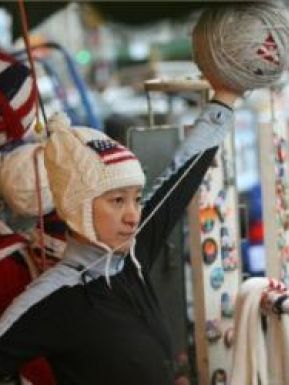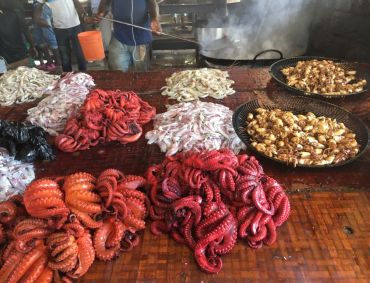Yoko Inoue
I am a multidisciplinary artist whose working methodology includes sculpture, installation, collaborative socially engaged art projects, and public intervention performance art.
I was born in Kyoto and raised in Japan and have been living in the US since 1991. During the period of working at the National Museum of Ethnology in Osaka, Japan in late 80s and at the Japan Society, a non-profit cultural organization, in New York City in early 90s, I developed questions about the way culture was presented to specific audiences in established institutions, often disassociated from political histories and contemporary socio-economic contexts. My interests in cultural identity discourse and the ways and means that objects gain or lose value, as well as my continuing need to express my ideas creatively led me to pursue a Master of Fine Arts degree from Hunter College of the City University of New York, where I was able to integrate visual art practice with cultural theory.
As an artist using traditional ceramic methods and other craft processes, I am concerned with the aesthetic value as an important expressive component of my work. As an object maker, however I also became fascinated by the communicative qualities that lie within the lineage of objects that reveal economic factors, cultural values and socio-political implications, especially when I started incorporating mass produced, commoditized cultural objects in my investigation. I began to alter these “objects” to elicit questions about cultural origins and contemporary societal attitudes that are associated with the objects.
My work experiences outside of the academic institutions and contemporary art venues have been diverse, working as a vendor at New York City’s farmer’s market, in retail sectors which generally rely on immigrant labor, and teaching craft and art for people with mental disabilities in a day-treatment program of a non-profit social service organization. As I began experimenting with public intervention performance projects, I recognized value and meaning were fluid in commercial venues and negotiation-communication skills were needed to pursue my projects. I became aware that any effective creative endeavor in the public realm could come to fruition only with the interplays of a broad range of social actors. Gradually I determined to situate my art practice outside the studio space to embrace social practice in an attempt to conceive an interactional art form seeking to instigate people to form a collaborative public action and encourage reciprocal skill-sharing.
I ponder themes of assimilation and cultural identity, investigating the causes of the commoditization of cultural values and effects of globalization on traditional heritage and social codes from an anthropological viewpoint. My visual work and performance art evolve, in part, from academic research, on-site fieldwork and cross-disciplinary collaborations. As a faculty member of Visual Arts and Center for Advancement of Public Action at Bennington College, Vermont USA, I explore new possibilities for research based art methodologies to engage cultural, societal, economic and educational theories. I strive to create an elastic space where pedagogy and artistic practices can combine with practice-led field research emphasizing social interactions in situ with the hope of stimulating more direct dialogues and creating opportunities for academia-community collaborations through creative interventions. I question how my work can effectively integrate with and help drive interdisciplinary community efforts to address various socio-cultural conditions reflecting broad range of voices from below. Counterbalancing theories and academic digestion of facts and numbers, I am interested in creating cross-pollination of specialized experiences. By evaluating the social role of craft, commensality and “impractical knowledge” in my research, I would like to find an effective art form that we can apply to rebuild community resilience.
Food and Politics: Social Kitchen
Currently I have been developing a research and community engagement art project, Social Kitchen: Ceramics, Food and Community, involving students, local practitioners and activists, that aims to elevate awareness about food insecurity issues.
My initial interest in food justice stems from my upbringing by macrobiotic parents and from time spent in a remote fishing and farming village on Awaji Island in the Inland Sea in Japan. I have long been interested in local and seasonal food consumption, ancestral knowledge of nutritional properties, food as medicine, community infrastructure based on land use and cultural heritage related to the agricultural cycles of life. I understood, intuitively, the interconnectedness between food, environment, culture and national identity upon seeing ancient indigenous rituals and witnessing the livelihood and wisdom shared by the local people. When I moved to the US, it was at the height of the debate about a multilateral free trade agreement concerning Japanese rice and other agricultural crops (GATT Uruguay Round in the early 90’s and recently TPP, now US-Japan FTA). I became aware of how the notion of food had shifted from life sustainable matters to the strategic “cash products” in the context of the global economy. While I payed attention to this debate as it was an important political agenda to study, I was unable to holistically connect these issues to my creative practices.
In the last 17 years, as an artist I have traveled to international venues for arts-based research and residency programs. These opportunities allowed me to observe the rapid transformation of local commerce and indigenous marketplaces in South America (Ecuador, Peru, Bolivia and Brazil) and in Europe (Lithuania). I saw patterns in how the local “foodscape” had been overrun by an industrial food complex and been forced toward extinction by mega-supermarket distribution systems. A similar transformation had been happening in Japan since the post WWII US occupation period. Through theoretical readings, attending conferences and thematic residency programs concerning food justice, and visiting research institutions such as CIP (International Potato Center) in Lima, Peru and CIRAD Historical Library (Center for International Cooperation in Agronomic Research for Development) in Paris, it made sense for me to create a practice-based cross-disciplinary platform where people can collectively participate in learning about food sovereignty issues in relationship to histories of colonialism and post WWII neoliberal economic policies. Through the filter of my art making practices, I hope to find a synergetic approach to these issues that stimulates new and unrestricted discussions to make a communal, civic or intellectual impact.
At Bennington College I put together a course proposal for a research and practice project in the Visual Arts curriculum to collaborate with a social service organization which has been imbedded in the local community of rural Vermont. I formulated a multi-disciplinary workshop-based structure where students and community members can, on one hand, learn and discuss poverty, agro-industrial food systems and food justice through research, and on the other hand, can perform to support impoverished local population of the town of Bennington by creating ceramic bowls for fundraising and by serving and sharing food to inspire rigorous dialogue about food justice through conviviality. We have completed our first experimental class and a community event in November 2016. Based on success and demand, we will be continuing this project in Fall 2017.
Submitted blog posts

